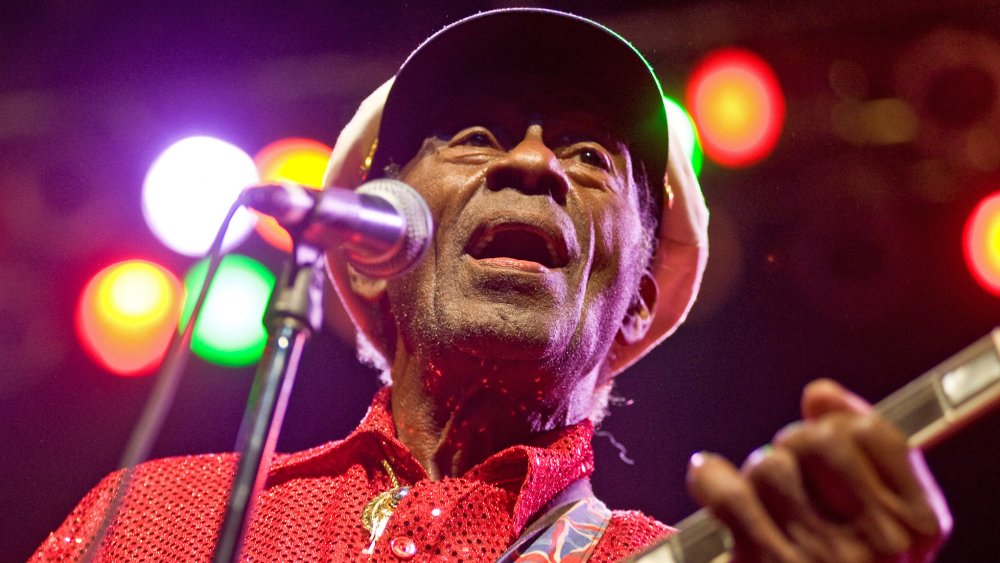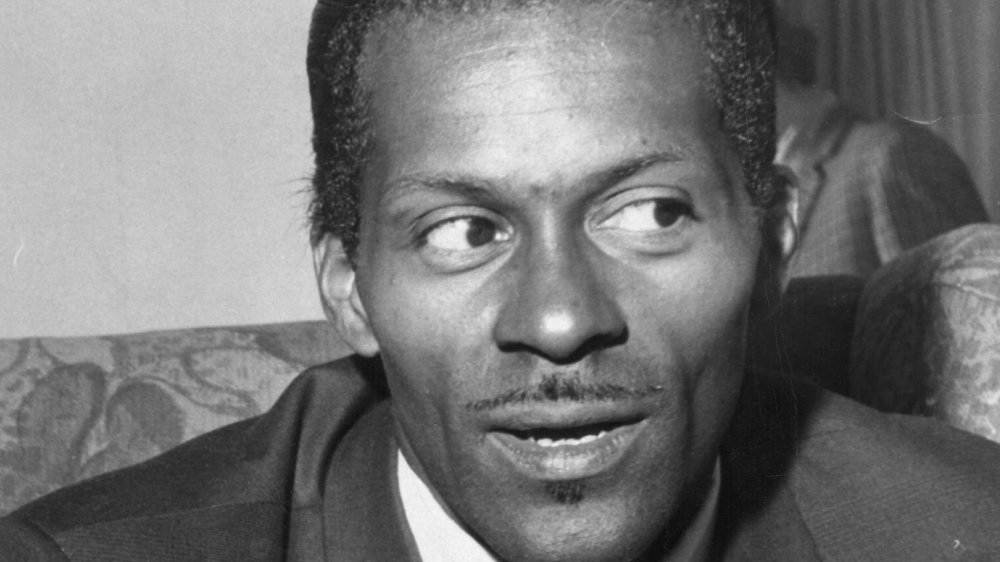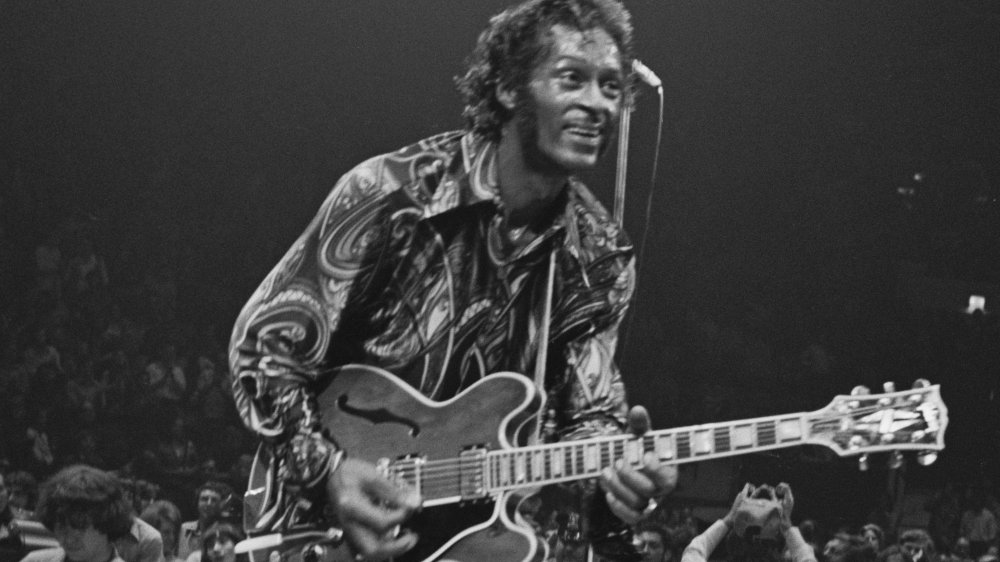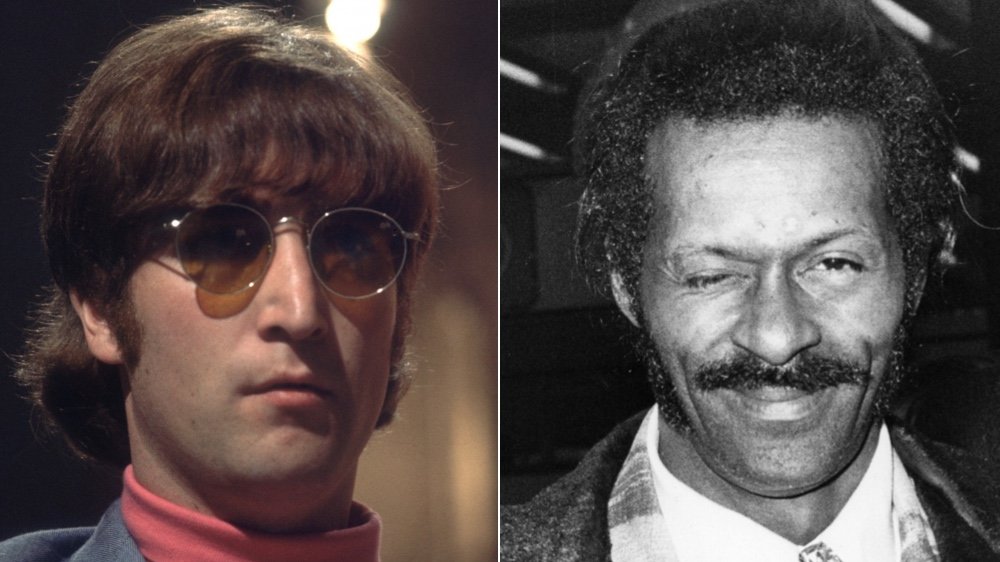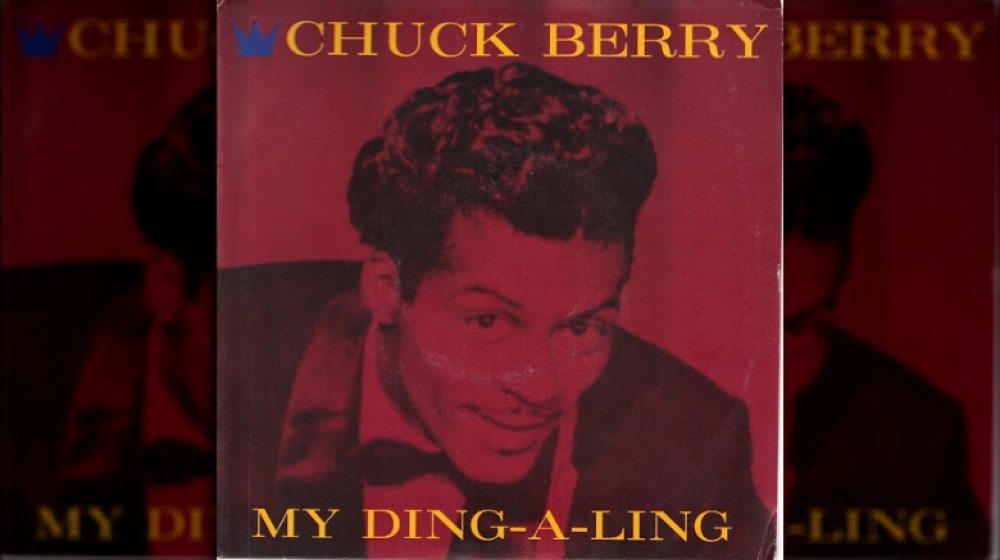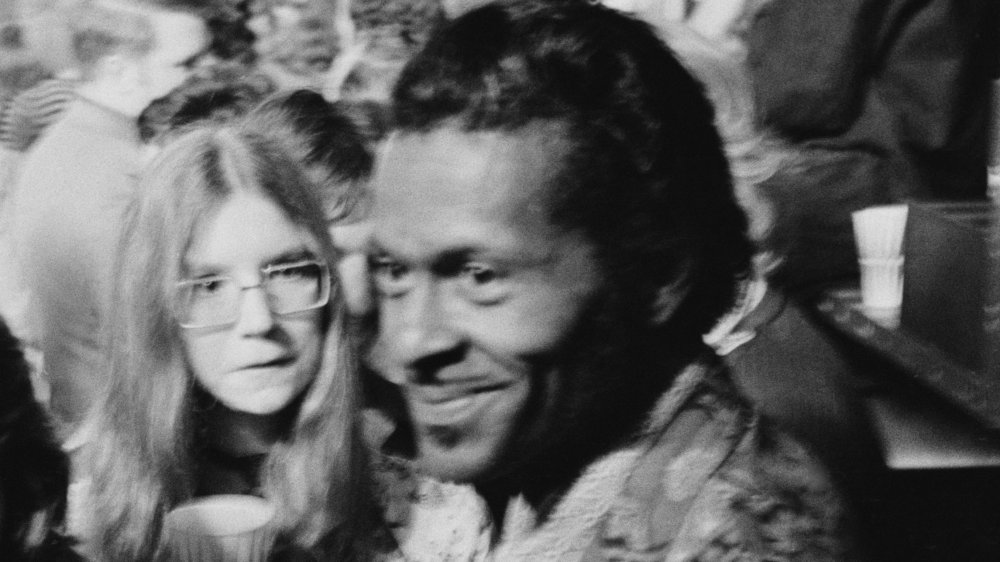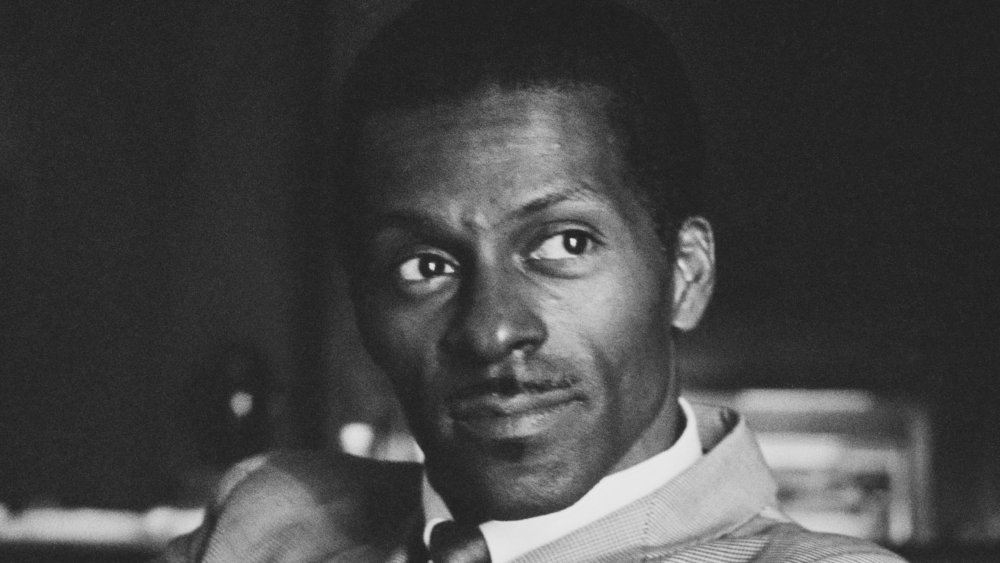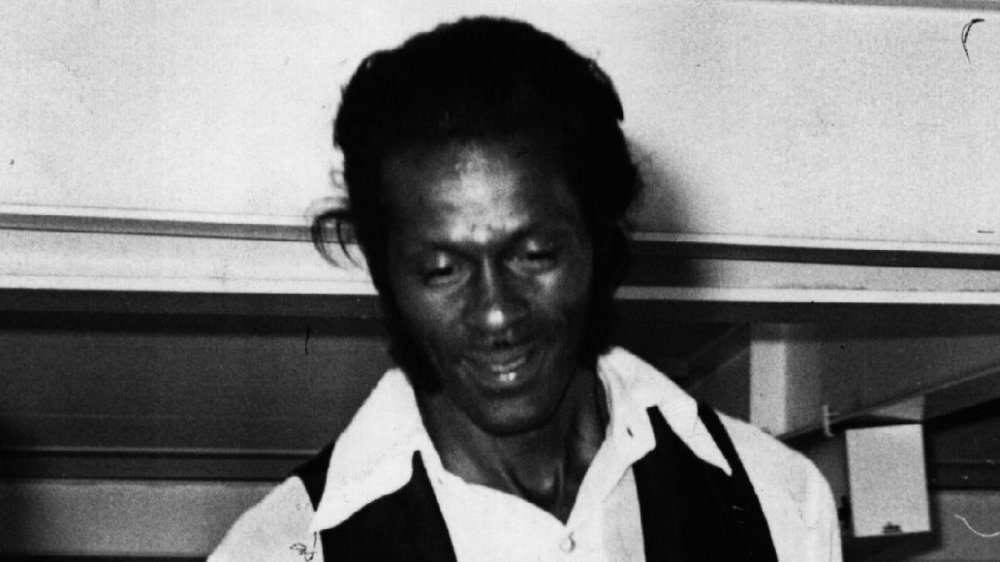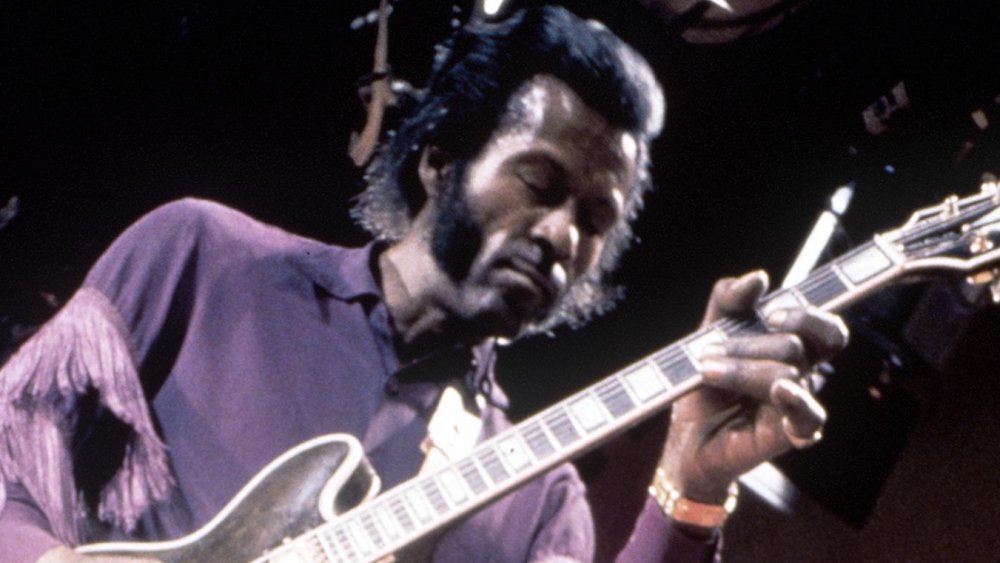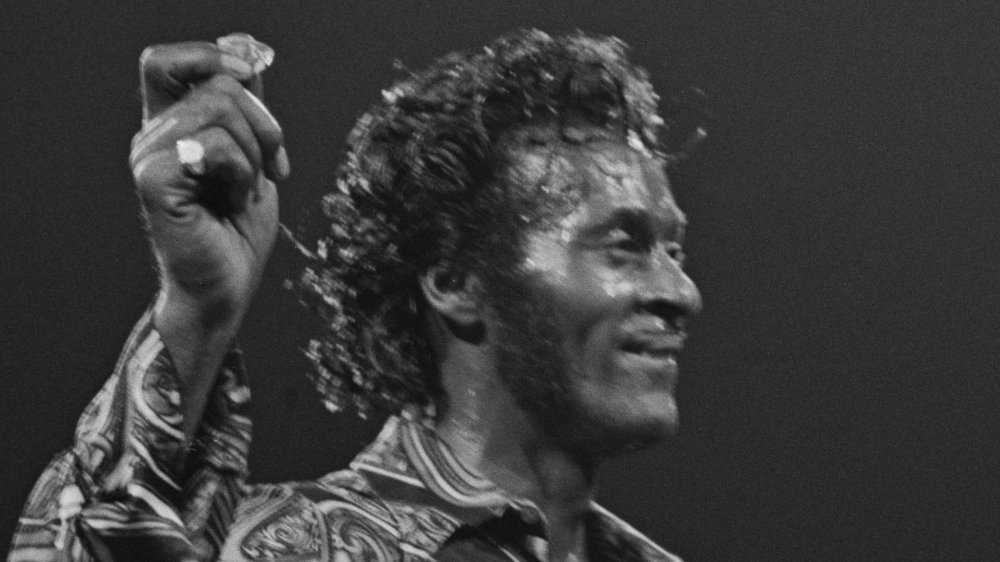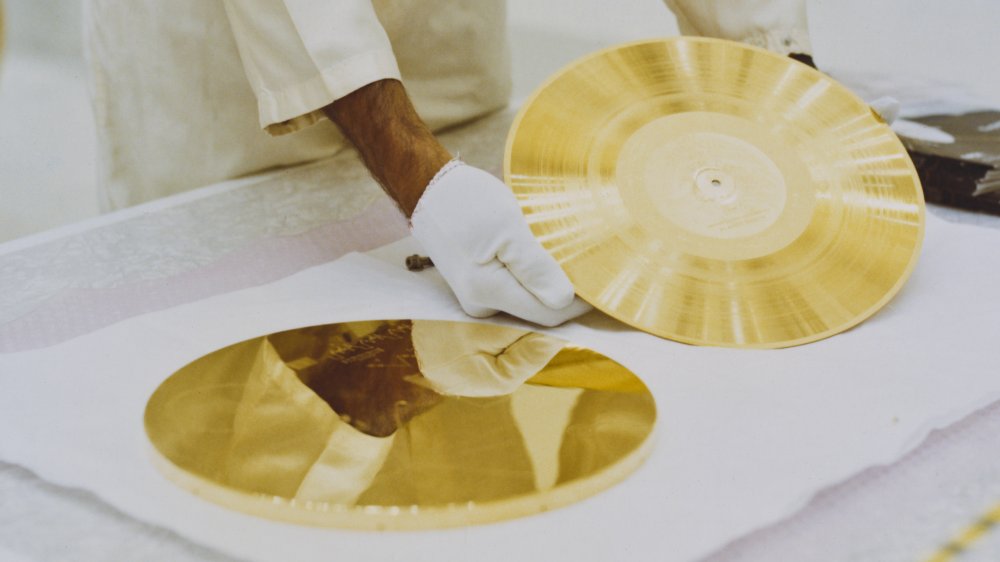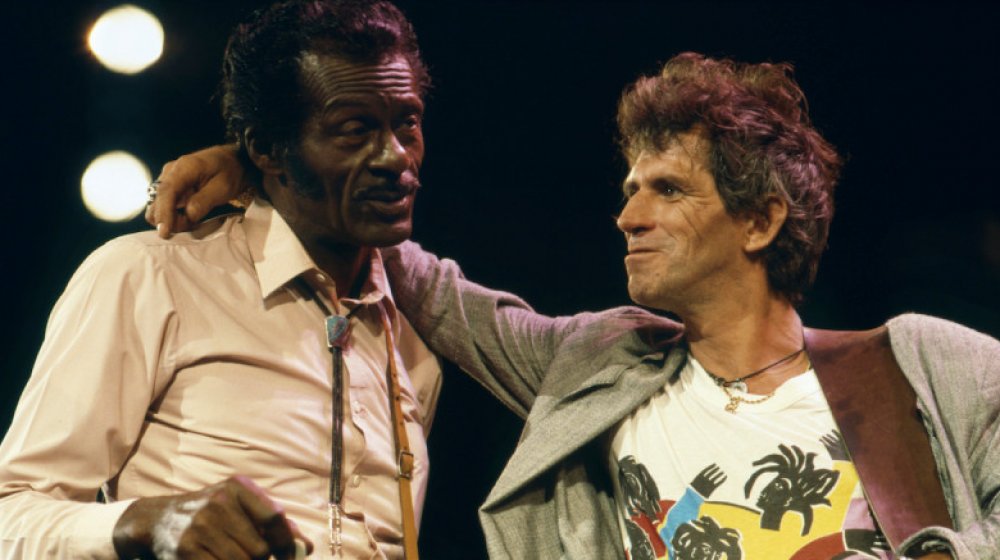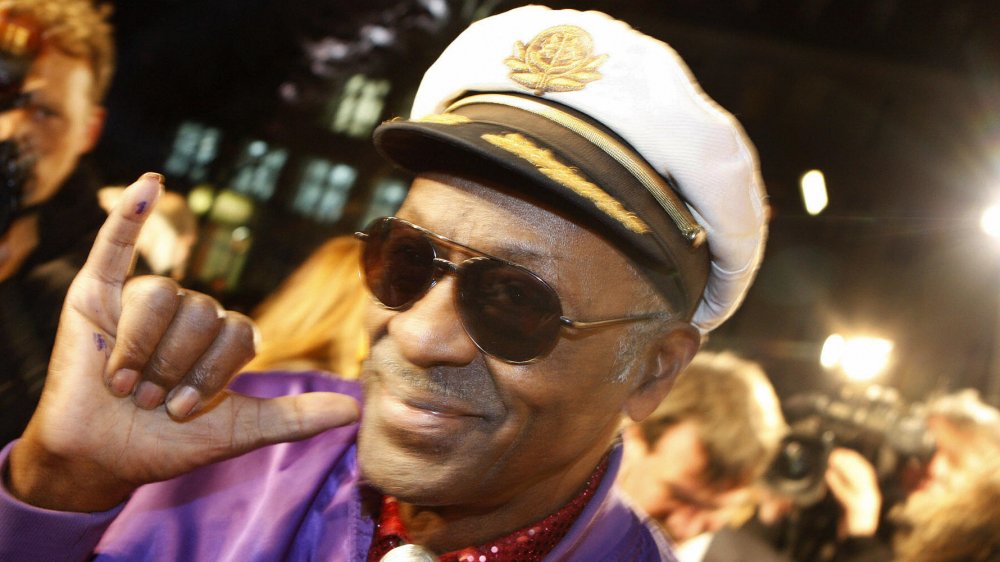The Untold Truth Of Chuck Berry
Most every rock 'n' roll singer or guitarist who's ever worked an arena full of fans into a frenzy owes a debt of gratitude to Chuck Berry. The man helped to invent rock music and codified many of its tropes, still followed by performers today. In the remarkably fruitful three-year period of 1955 to 1958, Berry recorded one eye-opening, formative classic after another: "Maybellene," "Roll Over Beethoven," "School Day (Ring! Ring! Goes the Bell)," "Rock and Roll Music," "Sweet Little Sixteen," and "Johnny B. Goode." Those songs became the template for rock music, incorporating blistering electric guitar solos, joyful vocals, and lyrics about the burgeoning teenage American culture. It didn't hurt that Berry looked the part, too, sporting a towering hairstyle and jumping all over every stage he took.
Not only did Berry help create rock music, but he was the first rock star, living a life full of headlines, scandal, controversy, and questionable decisions. Here's a look at the rocking and rolling life of Chuck Berry.
Chuck Berry got his start at a high school talent show
Since Chuck Berry helped devise rock music as we know it, he found his inspiration in different musical genres. According to his website, Berry tried to ape the silky vocal stylings of crooner Nat "King" Cole and wanted to play the blues guitar like Muddy Waters. The latter style would propel Berry to get up on stage for the first time. At a high school talent show in the early 1940s, Berry sang Jay McShann's jazzy, bluesy "Confessin' the Blues." Though performing the blues was slightly risqué for a teenager in that era, Berry was reportedly met by a rapturous ovation from his peers and so liked the way it felt that it was a foregone conclusion he'd continue performing.
Per Britannica, in his late teens and early twenties, Berry worked various jobs (and did some prison time for armed robbery) while playing in nightclubs on the side. In 1955, he moved to Chicago to pursue music full-time, and he got the attention of Muddy Waters, who told him to try Chess Records. It gave Berry a deal, and by the end of the year, the label had released his first single, "Maybellene."
How Chuck Berry learned to walk like a duck
There are only a handful of iconic stage moves in rock. There's Mick Jagger's rooster-like strut, the windmill-style guitar strum of The Who's Pete Townshend, and there's Chuck Berry's "duck walk." Marking one of the first times a rock 'n' roll performance would ever roll out a signature movement, Berry would play his guitar while crouching down low and would then hop across the stage on one leg, with his other extended.
Berry came up with the movement long before he ever picked up a guitar. When he was a little kid needing to grab a ball that had rolled under a table, he walked underneath it "stooping with full-bended knees, but with my back and head vertical," as he wrote in Chuck Berry: The Autobiography. He later incorporated it into his act, and he did it when he performed in New York for the first time. "Some journalist branded it the duck walk," he recalled.
The Beatles ripped off Chuck Berry
John Lennon once said, "If you had to give Rock 'n' Roll another name, you might call it Chuck Berry." Bruce Springsteen called Berry "rock's greatest practitioner." When Rolling Stones guitarist Keith Richards inducted Berry into the Rock and Roll Hall of Fame, he semi-jokingly upped that he "lifted every lick he ever played." Richards was on to something — some musicians were perhaps a little too influenced by Berry, to the point of copyright infringement.
According to Stan Soocher's Baby You're a Rich Man: Suing the Beatles for Fun and Profit, Berry recorded "You Can't Catch Me" in 1955, which includes the line "up come a flat top." The Beatles' 1969 hit "Come Together," largely written by Lennon, uses the lyric "here come old flat top." (Paul McCartney, who admitted in his book Many Years From Now that he stole the bass line from Berry's "I'm Talking About You" for the Beatles' "I Saw Her Standing There," noticed other similarities between "You Can't Catch Me" and "Come Together.") Music publisher Big Seven Music Corporation, which owned the Berry song, sued, according to The Beatles Bible, and settled out of court. Lennon later admitted in David Sheff's All We Are Saying that he wrote "Come Together" "obscurely around an old Chuck Berry thing."
Chuck Berry's biggest hit isn't his finest moment
It's undisputed that Chuck Berry helped put together the genre of music that would come to be known as rock 'n' roll and popularized it, too, with a string of influential songs in the mid-1950s, including "Maybellene," "Roll Over Beethoven," "Johnny B. Goode," and "School Day." While those all reached the top 10 of the Billboard pop chart, only one song in Berry's long career ever went all the way to #1. However, it isn't an important song, and it happened way past the performer's prime. That chart-topper: Berry's 1972 double entendre-filled novelty song "My Ding-a-Ling."
It's ostensibly about a boy who gets an exciting new toy that he calls a ding-a-ling, and he just can't stop playing with his ding-a-ling and also implores others to play with said ding-a-ling. (It was much easier to shock and titillate audiences in the early 1970s than it is today.) Berry's recording is a cover — "My Ding-a-Ling" first hit wax in 1952, courtesy of bandleader Dave Bartholomew, who is also the song's credited writer. However, Berry took full credit for composing it in its 1972 release, even after having already covered it as "My Tambourine" in 1968.
Chuck Berry went to prison for a minor offense
According to History, the US government enacted the Mann Act in 1910 as a means to crack down on interstate prostitution — it banned the transportation of a woman across state lines for "for the purpose of prostitution or debauchery, or for any other immoral purpose," per PBS. It's only ever been selectively enforced, including cases involving Charlie Chaplin, legendary boxer Jack Johnson, and Chuck Berry.
According to "The Trial of Chuck Berry" by J.P. Robinson, Berry said that in 1959, he met 14-year-old Janice Escalanti in a bar in Juarez, Mexico, and offered her a job working the hatcheck booth at the St. Louis nightclub he owned. Three weeks into the gig, Escalanti was fired and went to the St. Louis police, alleging that throughout the trip from Juarez to Missouri, and then in his home, Berry had sexually assaulted her 14 times. A jury consisting entirely of white men convicted Berry in March 1960, and he was sentenced to five years in prison and had to pay a $5,000 fine. Six months later, an appeals court ordered a new trial because of racist comments made by the judge in the first trial, but the conviction was upheld. Berry wound up serving two years behind bars.
Chuck Berry was sued for some very gross acts
While racism played a part in Berry's conviction in the 1960s, casting doubt on if he'd truly done the things he was accused of, his culpability in a 1990 legal matter was less questionable, owing to a mountain of evidence.
In the 1980s, Berry purchased and took an active role in managing the Southern Air, a restaurant in Wentzville, Missouri, just outside of St. Louis and not far from his home. It was there in 1990, according to the Los Angeles Times, that a female cook alleged that Berry had installed hidden cameras (both at the Southern Air and at his estate, Berry Park) to videotape and photograph women undressing or using the restroom. A handyman found a box of tapes full of incriminating footage, which featured multiple shots of the same women, from multiple cameras, edited into compilations. (Among the hundreds of people filmed were girls well under the age of 18.)
While Berry didn't go to prison for his actions, he was the target of a class-action lawsuit. He ultimately settled for $1.2 million, according to the Los Angeles Times, an amount split among 59 accusers. Additionally, the Southern Air quickly shut down, and Berry audaciously sued to have his tapes returned.
Chuck Berry's embarrassing drug bust
Around the same time that Chuck Berry was found to be recording women using the bathroom in his Missouri restaurant, he was the subject of a massive federal drug bust. In 1990, federal authorities, who'd long suspected Berry of using his status as a traveling musician to transport cocaine around the US (he'd allegedly hidden the drugs in his guitar case) raided his estate in Wentzville, Missouri.
The endeavor wound up a good news/bad news situation. The good news, for Berry, was that he'd apparently been wrongfully accused of cocaine trafficking, because the authorities found absolutely no cocaine on his property. They did, however uncover a small amount of marijuana and hashish, and a massive cache of pornography. Among the dozens of tapes, books, and photo slides were images of women who were not yet 18 years old. Berry was charged with marijuana possession and three counts of child abuse, owing to the underage pornography in his possession. His lawyers negotiated a plea deal, and while the sex crime charges were dropped, Berry wound up with two years of probation.
Chuck Berry was the cheapest man in rock history
From the time he was released from prison in 1963 up until shortly before his death in 2014, Chuck Berry played thousands of concerts. And on all those road trips, he hardly ever traveled with a set, permanent backing band. "Musicians are a pain in the a**," his lawyer and sometime piano player Bob Baldori told Billboard. "As a businessman, it didn't make sense." That's because hiring seasoned sidemen could cost a lot of money — at least a lot more than just rounding up a group of local musicians at each tour stop to form a pick-up band. Sometimes they'd hit the stage without any rehearsal or sound check. As Twisted Sister guitarist Jay Jay French told Inc., Berry left the hiring up to the concert promoter and just "assumed any bunch of kids would know all of his songs and all of his arrangements."
Berry's extreme frugality didn't stop there. He created his unique playing technique — playing two strings at a time to mimic the sound of two guitarists — because he didn't want to spend the money on hiring a second guitarist.
Chuck Berry was a cash-only guy
Not only was Chuck Berry very careful with spending the money he made, but he demanded payment in very particular and certain terms. Berry had written into his contract, according to ESP Entertainment, that he be paid in cash before the show. (If promoters wanted an encore, that had to be arranged before the concert — because Berry needed to be paid extra for that.) Twisted Sister guitarist Jay Jay French told Inc. that the provide-the-cash-beforehand-in-a-paper-bag policy stemmed from Berry not wanting to get cheated — promoters could very easily refuse to pay after a performance or write a check that might later bounce.
Of course, when one conducts all of their business in cash, it's easy for the financial record-keeping to get a little spotty. It's perhaps not surprising, then, that in 1979, Berry entered a guilty plea to charges of tax evasion. He was indicted for failing to pay around $110,000 to the government on his 1973 earnings. Berry earned a sentence of four months in prison and 1,000 hours of community service, which he performed by staging benefit concerts.
Chuck Berry went to space
In 1977, NASA undertook arguably its most ambitious space exploration idea since the Moon Landing, launching two unmanned spacecraft, Voyager 1 and Voyager 2, tasked with flying by and reporting on Jupiter, Saturn, and whatever lay beyond our solar system. Just in case one of the Voyager craft were ever to land on an alien planet or come into contact with an extraterrestrial ship, NASA loaded each with a gold-plated LP record full of music and sounds that would provide an idea of what life on Earth was like. Among this "greatest hits" album of humanity: works by Bach, Beethoven, and Mozart; folk music of Zaire, Peru, and New Guinea; and Chuck Berry's "Johnny B. Goode," which tells the tale of the rise of a great musician.
The project was overseen by famed astronomer Carl Sagan, who personally argued for the inclusion of Berry's song. "One member of the music selection committee sniffed that Chuck Berry's music was adolescent, but Carl Sagan reminded him that there are a lot of adolescents on Earth, too," album producer Timothy Ferris told NPR. "Not that we would expect the lyrics to make a great deal of difference to an alien civilization a billion years from now, but it's just a wonderful piece of narrative songwriting about how talent and hard work can change your life."
Chuck Berry's massive tribute was a massive disaster
In 1986, the Rock and Roll Hall of Fame inducted its first group of performers, Chuck Berry among them. At the ceremony, Berry got to talking with Rolling Stones guitarist (and Berry acolyte) Keith Richards and director Taylor Hackford about staging some concerts at the Fox Theatre in St. Louis to celebrate the performer's 60th birthday, which would be filmed, documentary-style. That would ultimately form the basis of the movie Hail, Hail Rock 'n' Roll.
Richards spearheaded the project, assembling an all-star backing band that included himself, Eric Clapton, Berry's legendary piano player Johnnie Johnson, and Robert Cray. After months of planning and weeks of rehearsal at his home, Berry suddenly got testy one day and stormed out. At another rehearsal on the Fox Theatre's stage, this one open to reporters, Berry got annoyed because Richards acted as bandleader. "You're gonna have to let me lead on the songs I sing," Berry shouted, according to the Los Angeles Times.
Berry and Richards made up, barely, but that evening's shows were disastrous, marked by technical problems and delays caused by setups for the documentary film. Concerts scheduled to start at 6:45 and 9:45 didn't begin until 7:30 p.m. and 12:30 a.m., and the documentary still didn't turn out as planned. According to producer Stephanie Bennett's book on the making of the film, Berry's vocals weren't up to snuff and had to be overdubbed later.
Chuck Berry regularly performed into his late eighties
The last top 40 hit of Chuck Berry's career: "Reelin' and Rockin' " hit #27 way back in 1973, and Rock It, the final studio album released while he was still alive, hit stores in 1979. But just because he was no longer actively recording didn't mean Berry retired. Instead, he became a road warrior, playing his 1950s and 1960s chestnuts to adoring audiences thousands upon thousands of times, according to Billboard.
In 1996, per Rolling Stone, he took the residency route, signing on to play a monthly show in the Duck Room at the Blueberry Hill, a nightclub in St. Louis. He kept up the shows for nearly 20 years, playing every month, like clockwork, for more than 200 months. (It was a family affair, too: PBS NewsHour reported that Charles Berry Jr. backed his father on guitar, and daughter Ingrid played harmonica.) According to St. Louis Public Radio, he decided to take a little break after his October 2014 concert, which doubled as his 88th birthday party. That would ultimately mark Berry's final show: The rest became a retirement, and Berry died in March 2017 at age 90.
